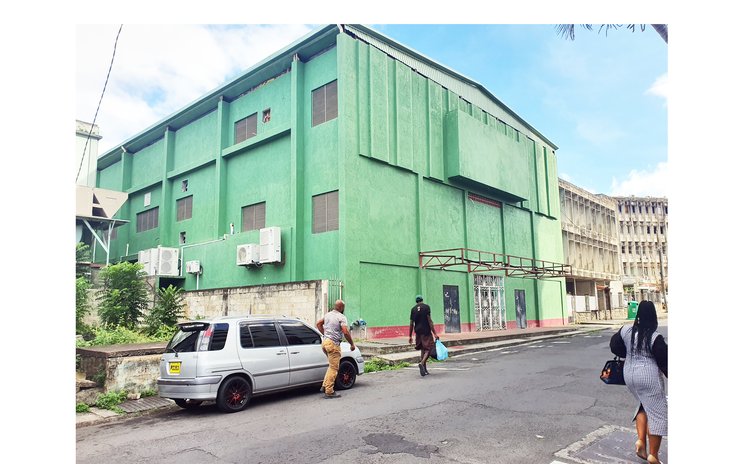What's happening with the Arawak House of Culture?
By Ronda Luke

The Arawak House of Culture, once pulsating with Dominica's artistic spirit, now stands silent and forsaken, awaiting its resurrection from the ruins of Hurricane Maria's wrath.
Janice Monelle, a passionate supporter of the arts, shares the sentiments of many, lamenting, "Every time I have to go to the Goodwill Primary School auditorium to see some very good productions, I get upset when I think that the Arawak House of Culture should be repaired and reopened and put into use for what it was meant for."
Her plea resonates deeply within the artistic community of Dominica, where voices unite in a chorus of urgency, calling upon authorities to breathe life back into this cultural cornerstone.
After the category five storm had passed, the then minister responsible for culture, Roselyn Paul, assured us that efforts were underway to restore the building to full operation.
In February 2021, she elaborated on the ongoing refurbishment and rehabilitation efforts, emphasising that despite the external appearance of disrepair, significant progress was being made internally.
Paul further explained that internal work was slated to continue for three months before the painting phase commenced.
"The equipment for the stage is here, and we also have the chairs; the sound systems are here for the theatre. So, within the next three months, we will have three different groups of people working on different aspects of the project to bring it to completion because much of the work will happen simultaneously. And then we will have just the painting and facelift of the outside," Minister Paul added.
However, despite these assurances, little to no updates have been provided three years later regarding the progress towards completion.
With three decades of experience in arts and drama, Gloria Septra Augustus, president of La Cour des Arts de la Dominique Inc. and a former member of People's Action Theatre, is at the forefront of advocating for preserving arts and culture in Dominica.
Despite her appreciation for the existence of theatre in Dominica, Augustus finds herself disheartened by the environments in which it operates, lamenting that they often fall short of the standard expected for such artistic endeavours.
"We're supposed to be in a proper theatre, with lights where there is sound and you can project. The places where dramas are performed due to the absence of a proper theatre takes away from the ambience, as a lot of times, for certain scenes to have an effect, you need to close the curtain; you need to fade into another scene, we cannot do that there," she declared. "Theatre in Dominica is not just as it should be; we must try and get the Arawak up or somewhere quickly. So we can improve the standard of our drama."
Augustus observes that the state of theatre in Dominica is significantly lacking compared to theatres in other countries in the region. She emphasises that while talent is present, it is essential to nurture it properly. Providing the appropriate space for artists to express themselves is crucial for fostering their artistic growth and development.
"I am making a plea. I've said it before, I've said it many times, But we need a theatre space. We need a proper auditorium, a place where we can do plays, have shows and events, where rain doesn't have to affect us, and where we can do it as it should be."
She further laments that her group is "suffering" as it struggles to secure a space for rehearsals and plays despite competition with other organisations for available venues in Dominica.
Echoing similar sentiments, Anita Bully, the wife of the late cultural icon Alwin Bully, says, "It is so frustrating. The standard of shows is being seriously affected by this. We need a closed theatre place, with a backstage space, proper lights and sound, covered seating, etc.
Speaking to The Sun last year, Mrs. Bully passionately advocated for increased government and societal investment in educational arts. Recognising the profound impact of the arts on culture and identity, she underscored the importance of concerted efforts to preserve and foster Dominica's artistic heritage.
"The government needs to do more to promote the arts," Mrs. Bully asserted. We have been asking them to at least give one scholarship annually in the visual and performing arts, but this hasn't been done."
She highlighted the significance of educational opportunities expanding beyond administrative, medical, and legal fields in a diverse society. As a cultural advocate, she expressed concerns about the lack of incentive for young people to pursue artistic careers, which is often undervalued. Underscoring the economic advantages of investing in the arts, she pointed to Trinidad's thriving Carnival film industry as evidence of the profitability of cultural arts expenditures.
Her call for greater support extends beyond governmental bodies. She emphasises the importance of the business community joining forces to foster artistic growth.
"This is another major concern to us because it seems like most of our businesses are only supporting sewo and forgetting about the arts and the culture," she declared.
"Is that what we want Dominica to be recognised for? I mean, come on. We talk about ourselves as a Nature Island. We talk about ourselves as the cultural capital of the Caribbean, but if we don't do something about it, we will lose that. So we need to get on the path to putting value behind initiatives such as these," she added.
With the allure of technology often overshadowing cultural pursuits, she went on to express concern over the youth's increasing reliance on phones and urged a return to appreciating meaningful experiences that foster personal growth.




